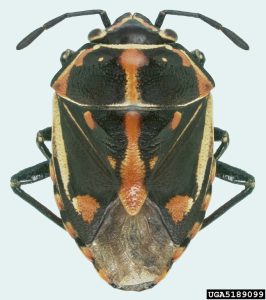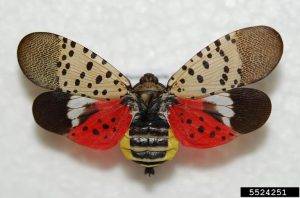Recap of January First Friday with Florida First Detector

Photo: Natasha Wright, Braman Termite & Pest Elimination
In January, we talked all about stink bugs and other hemipteran insects. We focused on invasive insects in the subfamily Heteroptera. The subfamily Heteroptera includes not just stink bugs, but also lots of other true bugs like plant bugs, assassin bugs, bed bugs, leaf footed bugs, water scorpions and more!
While we talked about many bugs, we focused on two species, Bagrada bug (Bagrada hilaris) and Spotted lanternfly (Lycorma delicatula). Both are hemipteran insects, so they have a piecing sucking mouthpart that pieces into plants. As with many invasive species, both can cause problems in agriculture and horticulture. Bagrada bug is a stink bug pest of cruciferous crops like cabbage, broccoli, kale, cauliflower and more. Spotted lanternfly can damage hardwoods and fruit trees like maple, oak, sycamore, peaches and others.

Photo: Lawrence Barringer, Pennsylvania Department of Agriculture
Both of these species have been introduced to the United States. However, they are NOT yet found in Florida. This means we are on the lookout for both of these species. Bagrada bug has been found in at least 5 states in the Southwestern US. Spotted lanternfly is currently present in at least 14 states in the Northeastern US. If they end up in Florida, early detection is key to potentially eradication or stopping further spread.
Resources on Hemipteran Insects and Identification
- ASK IFAS Stink Bug Articles
- Bagrada Bug EDIS
- Brown Marmorated Stink Bug EDIS
- Spotted Lanternfly EDIS
- USDA Updates on Spotted Lantern Fly
Want to watch the recording?
What is the upcoming schedule?
We are meeting online via Zoom from 12:00PM-1:00PM on the First Friday of every month from Sept 2022-Aug 2023. Please visit this blog for registration information and the upcoming schedule.
Questions?
Contact Dr. Morgan Pinkerton, morgan0402@ufl.edu
Or
Visit the Florida First Detector Website
Source: UF/IFAS Pest Alert
From: Read More



